skip to main |
skip to sidebar
We have been home from Kufunda for 15 days now.
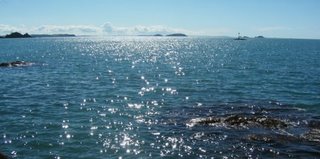
The dichotomy of living in a culture that has so much material wealth and displays such little respect for life - earth, air, fire and water versus having just experienced a culture that has minimal material wealth but a spirit for celebrating what they do have - is working on me.
Sitting here on a cliff overlooking a huge and beautiful, ever-changing ocean vista I go back to Zimbabwe for a while...
Visiting the small village of Zcimba, in the Mugabe home district, was full of so many emotions, shocks and joys.
We arrived as the sun was setting under a blanket of grey cloud, but the welcome was like sunshine lighting up the whole village. Their flag of welcome to the Kufunda village that said everything about how much they appreciated the help they had been given by the Kufundees. But they expressed it with their whole bodies. The high pitched lelelelelelelelele from the woman as they sang, danced, embraced us all, and opened their homes and hearts to us. I felt so happy to be there, yet somehow inadequate in my response.
The evening began with a circle gathering in the pre-school building, which had big dollops of the absurdities of some of our western help. After some food we gathered again to pass the talking piece and share a little about who we were. The Zcimba community organisers spoke near the end and made reference to some of the work they had done and achievements since the Kufundee's last visit. They had helped their local community to build 123 compost toilets over the 2005 year, and this was a celebration.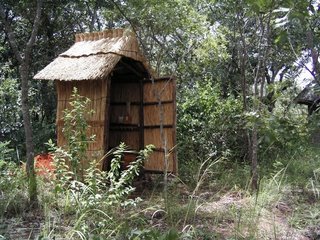 A moment of silence followed, after everyone had spoken. Then a voice! A song had begun and others joined, then the women - the community organisers were up.
A moment of silence followed, after everyone had spoken. Then a voice! A song had begun and others joined, then the women - the community organisers were up.
Picture these strong, passionate, energetic woman of every age (though the elders seem to have the biggest numbers). They are dancing like the heavens had opened and showered them with every imaginable gift - their gratitude was palpable. And their lyrics told of the strength of these spirited women.
We had been shown our rooms, and as the dancing and singing came to a natural end we wandered back to our places of rest - beds which had been surrendered for the night, a hammock tent for the hardy, or the back of the van for some others.
As we came together for breakfast I felt some humility, at realising how much I have in terms of the access to good food, a comfortable bed, a shelter that doesn't leak, electricity to run my computer and give me light, ease of travel, and so on and on. I was very grateful for the porridge they went out of their way to bring us - as an alternative to the hard Maize meal, that is their staple.
Then we were shown around some of the neighboring villages, to see and celebrate their composting toilets. These toilets seemed such a sign to me, that unlike us in the west with our fecal fear, and deep reluctance to take care of our own ----, they are making the re-connections between human beings and nature.
They are working with and responding to the obvious link between soil and food. I sense they are seeing that we have to participate in and preserve nature, and not be only on the take, if we are to feed ourselves. We must become an active part of the cycle.
Back at the school grounds, it soon became clear, there was a party going on! It began slowly and sustained for a long time, before the kids came on and gave us a show of energy and happiness that left us all smiling till it hurt.
I feel part of a culture in which like many others, I am so often, so self-concerned. I wonder. Where this ability comes from? The ability to live on the edge, not knowing if, a failure of their health (and inability to get help), their neighbours stealing their food, their elected representatives, a failure of the crops, the weather, or the next financial crunch, is going to bring them more hardship. And in the midst of this to be able to dance and sing and express love and gratitude. Where does this come from?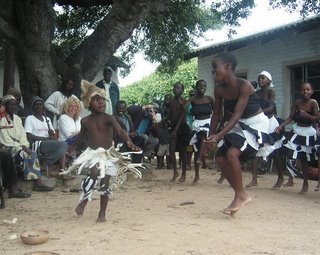
 It has only been a few days since we arrived and already I feel deep gratitude for the people and their heart. The invitation to participate in an Open Space technology event one day, was a welcome chance to offer something , anything, back to the Kufunda community.
It has only been a few days since we arrived and already I feel deep gratitude for the people and their heart. The invitation to participate in an Open Space technology event one day, was a welcome chance to offer something , anything, back to the Kufunda community.
Open Space Technology was created in the mid-1980s by organizational consultant Harrison Owen when he discovered that people attending his conferences loved the coffee breaks better than the formal presentations and plenary sessions.
Combining that insight with his experience of life in an African village, Owen created a totally new form of conferencing. Open Space conferences have no keynote speakers, no pre-announced schedules of workshops, no panel discussions, no organizational booths. Instead, sitting in a large circle, participants learn in the first hour how they are going to create their own conference. Almost before they realize it, they become each other's teachers and leaders.
There are some simple rules to this process and Kim and I both enjoyed being on the side of giving from our knowledge, to this community which is so open to listening and considering new ideas to see if they may be applicable and helpful.
Kim spoke with some women about different approaches to early childhood education, and I demonstrated a method of low energy cooking.
A common site was women carrying big loads of firewood on their heads - wood is the only cooking fuel for a lot of communities, and deforestation is a real issue. The Kufunda community is playing their part by helping others communities build efficient fireplaces (using material from old termite mounds).
My offering was to show how it is not necessary to keep a pot boiling in order to cook food, but if it is brought to the boil then kept highly insulated, it will continue to cook - just more slowly. So we put some rice in some cold water, brought it to the boil and put it in a large carboard box stuffed with straw, so that the pot was surrounded on all sides. 30 minutes later it was cooked. This fuel saving method was well received and because it was demonstrated, will probably be embraced.
While our experience of Open Space (one of the simplest, most brilliant combinations of order and chaos, which is most powerful when conducted over two or three days) was very brief, it offered a delicious taste of what it could be.
 On the afternoon of the first day, Marianne and several of the other Kufundees invited us into a Circle. This was the first indication that this community was being built with processes that were simple, real and practical.
On the afternoon of the first day, Marianne and several of the other Kufundees invited us into a Circle. This was the first indication that this community was being built with processes that were simple, real and practical.
We were introduced to the idea that learning can be exchanged between everyone. When we open ourselves to receive from others and when we assume we have something to give no matter what we assume is our 'position' in society, our experience, knowledge, qualifications, or how much paper (money or property titles) anyone holds.
That evening we went to Harare for a night of comedy in the Book Cafe. Happily these brave people were able to bring their much needed humour to address the political madness that surrounds them.
The next day we had a trip to Highfield, a ghetto in Zimbabwe's capital of Harare. This was, in Chris' words, "where we met some righteous youths fighting to make a difference in their community with permaculture, art and wisdom as their weapons."
We were invited into their humble house where the Highfield activists called a circle and introduced us to the various collectives that made up their group and what each one was engaged in.
The Arts Collective included activities such as the Theatre of the Oppressed (I hope to get some video material from them). The Media Collective who were printing and communicating their own news. The Permaculture Collective who were networking and involved in health issues and growing food. And The Labour Collective who supported Labour Unions and other Civil Organisations. Kim said it was how she imagined a visit to a Black Panther meeting in the US might have been back in the days when they were a force for positive change in their community in the US.
It was during and after this visit that I periodically experienced a persistent flow of moisture from my eyes and become aware of a cramp in my chest, which I was able to relax through to some extent. It was an experience that continued throughout the 12 days we were with these Kufundees and all the other spirited people they introduced us to.
These are mostly young people who know that the future is in their hands. Maybe the fact that Kim and I are expecting a baby in July had something to do with the emotions I felt.
When we gathered again in a circle back at Kufunda, to share the feelings and thoughts about the Highfield visit, Marianne touched a nerve for me by expressing that she felt a sense of "no hope, but not despairing." I wonder where hope comes from? Is it a sense of having a ticket in a lottery that we hope we might win and that outside forces will take care of everything for us?
My feeling is that the Highfield community have said "enough!" and are now working to build their community up from there. They are not willing to descend any further and in that sense I feel that they are ahead of us, living as we do in our comfortable homes consuming the planets blood/oil. It seems that we have yet to come to that point.
For more pictures from this day click here.
Links to more information about "Calling a Circle"
Buy Calling the Circle from Amazon
View and download guidelines for Calling a Circle
I will post more in the coming days, and the big lessons didn't come until the last days. :-)
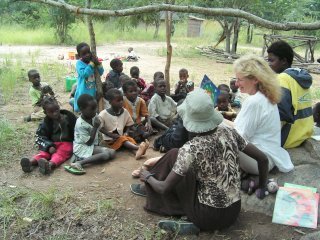 Preparation for what was to come included the news reports I read just prior to leaving which described droughts and fighting over food in Zimbabwe, and then on the plane's in-flight screen watching "The Constant Gardener" about pharmaceutical malpractice in Africa and a CNN story about fighting in Nigeria.
Preparation for what was to come included the news reports I read just prior to leaving which described droughts and fighting over food in Zimbabwe, and then on the plane's in-flight screen watching "The Constant Gardener" about pharmaceutical malpractice in Africa and a CNN story about fighting in Nigeria.
But the on the descent into Harare Airport on the last leg of the travel, we saw wide expanses of flat green country dotted with trees, lots of water and very few signs of settlement. So much for the media - From West to East across this country anyway there has been more rain than they wanted, and its the excess water that has threatened their Maize crops this year.
But from the moment we landed we felt quite safe and unthreatened. Our journey in Zimbabwe took us to several small villages, to the tourist town of Victoria Falls, a Game Reserve, the Harare ghetto, and finally to the Eastern Highlands. Despite the obvious struggles and ever-present poverty this feeling never left us. All the early signs - that this trip was meant to be - were confirmed at each step, and with every lesson and exchange that made up our external and internal journeys.
Arrival at Kufunda village began with a greeting from Claudia, a young German woman, whose bubbly energy was contagious. She showed us around and made us feel at home. It rained just as we began unpacking, and a naked shower outside under the overhang from the thatched roof with bare feet on African soil was the first gift.
Zimbabwe is a country in crisis. The petrol queues are one visible sign of an economy on its knees. With the latest inflation figures at 700% the poor are being left behind and are not even stepping on the first rung of the economic ladder. Then imagine 700,000 people made homeless last year in a government mission politely called "The Big Cleanup" and known on the street as "The Tsunami." Bulldozers were used to knock down the people's shantytown shelters built in and around the city, which forced people to move out into the country - but unfortunately after years of colonisation and white-owned large scale commercial farming, they have minimal tools for this new life.
Step in Kufunda village. A small group of passionate Zimbabweans working to demonstrate and teach principles of self-reliance, and by all accounts being highly effective in their quiet unassuming way. Kufunda village was born four years ago, and given the political and economic landscape in which it has grown, what they have achieved in that time is remarkable. We had arrived a day early, so the Learning Journey began properly the following day when Bonnie from South Africa, and Steve and Matt from the US had arrived. The sixth participant was Chris from middle America, who had been staying at Kufunda for some time already, and offering his Permaculture wisdom and assistance.
A walk around the next day gave a feeling for how far they have come.
- composting toilets abound - the nutrients used to grow fruit trees,
- a large herb garden and processing room, where healing ointments and solutions are made to offer some assistance to the many people with AIDs and its symptoms,
- bee hives for honey and used as the base for some of the ointments,
- a pre-school (see picture above) - no building, but the children and teachers are doing wonderful work,
- kitchen facilities with wood cooking facility that uses minimal wood,
- library of books on a wide range of practical subjects,
- multiple dwellings and meeting rooms made with earth bricks using a cinva ram, and local thatch,
- vegetable gardens and young fruit trees.
To see pictures from these first two days at Kufunda, click here.
There is probably much I missed in this list, but it gives you a feeling for the steps they have taken towards self-reliance in four short years, while also assisting many other villages to begin this process - but those stories are still to come. . .
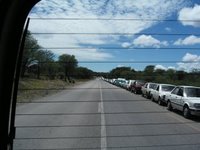 A not uncommon sight of a queue of vehicles waiting to buy petrol.
A not uncommon sight of a queue of vehicles waiting to buy petrol.
Our friends at Kufunda told us that before they managed to pre-purchase fuel in US Dollars, they had to queue and sleep in the van for four days in order to fill up.
The African journey was more than we could have hoped for.
Marianne Knuth and the community at Kufunda are doing fantastic work, and my feeling is that they are leading the way and offering wisdom and direction for not only their African culture, but for all cultures of the world as we step into an uncertain future.
With the environmental, social, political and economic landscapes changing ever more quickly in the coming years, we the people of the world will be looking more seriously for better ways to organise and respond quickly to the needs of each regional community, and seeking means and tools to help us become more self-reliant. This small Zimbabwe community has made steady and significant steps in all these areas over the last four years since its inception, while simultaneously assisting several other communities in their region to do likewise.
A thought that kept arising was that these communities, as materially poor as they are may be, are a representation of how our western societies may look when the cheap oil runs out and our artificial or temporary affluence becomes a thing of the past. I only hope we have as much spirit and resilience as these people have when things get tough.
They were truly an inspiration.
Kim and I are immensely grateful for the opportunity to visit Kufunda, and other rural villages who are at earlier stages of this process. We are happy to know that along with a deep learning experience for us, we were also able to offer ideas and practical knowledge which they in turn were grateful for.
This well organised and full 12 day Learning Journey was a two way street, and the small group of five visitors of which we were a part, all came away having received a great deal, that I am sure we will all be processing for a long time to come.
It is my intention to offer some more details about the experience and lessons in the coming posts.







